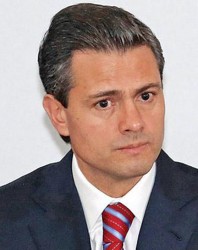Mexican President Enrique Peña Nieto’s decision to indefinitely suspend teacher evaluations — the core of his much-applauded educational reform — is a catastrophic mistake that stains his presidency and is likely to hurt Mexico for decades to come.
It sounds like an exaggeration, but it isn’t.
As the World Economic Forum and other groups have pointed out, the single biggest reason why Mexico isn’t growing faster is not bad economic policy — as one could say about Venezuela and Argentina — but its rotten education system. Because of its bad schools, Mexico can’t have a more skilled labour force with which to compete with China, South Korea, and other rapidly growing manufacturing economies.
Mexico’s education system has long been taken hostage by powerful teachers’ unions that want to preserve privileges such as mapping the country’s education policies and allowing its loyalists — regardless of their academic credentials — to buy or inherit life-long teaching jobs.

Many Mexican teachers are hired through union connections and never even set foot in a classroom. According to the Mexicanos Primero education-advocacy group, there are 298,000 teachers in Mexico’s public schools who never teach but work as political activists for teachers’ unions.
Not surprisingly, despite spending much more on education as a percentage of its economy than China and most Asian countries, Mexico finds itself — alongside Brazil and Argentina — at the bottom of the list of 65 countries that participate in the international PISA test of 15-year-old students’ academic abilities.
And not surprisingly, only about 25 per cent of Mexican youths enter college, compared with 93 per cent in South Korea.
Shortly after taking office in 2012, Peña Nieto made headlines by sending former all-mighty teachers’ union boss Elba Esther Gordillo to prison on corruption charges and carrying out a bold educational reform that included teacher evaluations and setting higher standards for hiring new teachers. Peña Nieto hailed it — with good reason — as a turning point in Mexico’s history.
But now, amid the radical CNTE teachers’ unions threats to disrupt Sunday’s mid-term elections in their stronghold states of Oaxaca, Michoacán, and Guerrero, the Peña Nieto government has announced the “indefinite suspension” of teacher evaluations, which had been a key demand of the union.
The suspension effectively nullifies a nationwide test for about 250,000 aspiring teachers that was scheduled to take place starting June 15 and the evaluation of 1.2 million teachers over the next three years.
“Cancelling teacher evaluations nullifies the educational reform, betraying millions of children in our country,” a statement by several non-government groups said this week. Peña Nieto has caved in to blackmail by teacher-union leaders who are against quality education, it added.
Mexicanos Primero, one of the groups that signed the statement, says the decision might be challenged in the courts because the government’s educational reform was passed as a constitutional amendment.
The government’s reversal of its education reform for fears of violence by radical CNTE teachers during Sunday’s mid-term elections is a sign of weakness that could also hurt the government’s energy, communications, labour, and fiscal reforms. If Peña Nieto invalidates his most important reform, how is he going to convince investors to trust in his ability to carry out the other reforms, the group asks.
There is some speculation in Mexican media that Peña Nieto might have suspended teachers’ evaluations as a ploy to persuade the CNTE teachers’ union not to disrupt Sunday’s elections, and that the government will re-instate the teacher evaluations shortly after the elections. This is a tempest in a teapot, some say.
My opinion: I don’t think so. In the short run, the suspension of the teacher evaluations will empower the CNTE by proving that it can effectively blackmail the government into eliminating the core of its education reform. If Peña Nieto re-instates teacher evaluations after Sunday’s elections, the CNTE leaders are likely to threaten with a general strike in Oaxaca, Michoacán, and Guerrero when the new school year begins in a few months.
In the longer run, this is a tragedy for Mexico, because the country will never get out of its mediocre growth rates as long as tens of millions of children are taught by teachers without academic credentials who buy or inherit their jobs or work as professional union activists.
This was the worst mistake of Peña Nieto’s presidency, and — barring its immediate reversal — will cast doubt on the future of all of his reforms.
© The Miami Herald, 2015. Distributed by Tribune Media Services.





